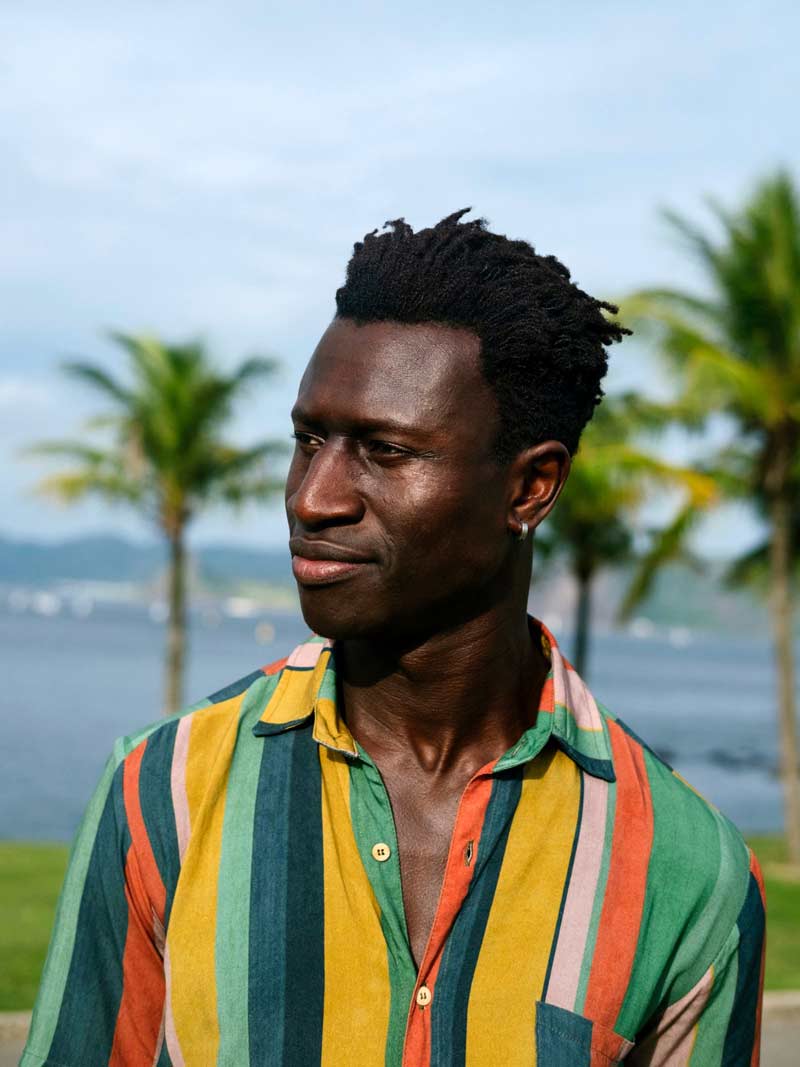Seit jeher begreift sich AFRIKAMERA als Ort der Vernetzung und des Austauschs von Know-how zwischen Filmschaffenden, Produzent*innen, Verleihern und Festivalmacher*innen sowie Nichtregierungsorganisationen aus den Bereichen Bildungs- und Wissenstransfer und Entwicklungszusammenarbeit – aus Deutschland, der afrikanischen Diaspora und den afrikanischen Ländern.
Im Rahmen der 15. Ausgabe wird es drei öffentliche Diskursformate zum Thema Migration und Diaspora geben:
11.11.22, A2 (kleiner Saal), Arsenal
20.30 Panel: NARRATIVES OF ESCAPE
Afrikaner*innen gehörten bei den großen Flüchtlingsbewegungen seit 2012 europaweit zu den Geflüchteten zweiter Klasse. Auch in Berlin hatten sie keinen Zugang zu staatlichen Unterstützungs- und Eingliederungsangeboten und machten beispielsweise mit der Besetzung des Oranienplatzes in Kreuzberg auf diese Missstände aufmerksam. Seitdem hat sich leider nur wenig geändert, lediglich mit der Hilfe von ehrenamtlichen Initiativen und NGOs konnten notwendige Maßnahmen zu Aufenthalt und Versorgung organisiert werden. 2022 zeigt sich ein ähnliches Bild: Afrikanische Studierende, die vor dem Krieg in der Ukraine in andere europäische Länder flüchten, fallen auch in Deutschland durch alle Raster. Schon auf der Flucht in der Ukraine und an den Grenzen diskriminiert, haben sie nicht den gleichen Zugang zu den umfassenden Hilfsangeboten der Regierung und müssen von ehrenamtlichen Organisationen unterstützt werden.
In dem Panel NARRATIVES OF ESCAPE sollen die Aspekte dieser Ungleichbehandlung und die Rezipienz der mittlerweile zum europäischen Alltag gehörenden Bilder mit Berliner Aktivist*innen diskutiert werden. Dabei wird auch die Frage beleuchtet, welchen Einfluss Dokumentarfilme auf gesellschaftspolitische Entwicklungen haben können.
Panelist*innen: Ousmane Samassékou (Mali), Fatimah Dadzie (Ghana), Ager Oueslati (Algerien/Tunesien/Frankreich), Vertreter*innen von Tubman Network Berlin und Nyima Jadama von „Nyimas Bantaba“ (Alex Berlin).
Moderation: Juana Awad
In dem Diskursformat „THE ART OF COLLABORATION – Migration & Diaspora“ setzen sich afrikanische und europäische Filmschaffende und Multiplikator*innen in verschiedenen Diskussionsrunden und einem Roundtable mit Fragen rund um das (afro)-diasporische Filmemachen auseinander. Dabei werden Fragen nach Identitäten, Narrativen und Hintergründe und den wechselseitigen Einfluss der diasporischen Community und der Mehrheitsgesellschaft auf die Filmsprache gestellt und die Zusammenarbeit und Netzwerke für das transnationale Filmemachen beleuchtet. Damit verbunden sind Diskussionen, welche Geschichten diasporische Filmemacher*innen in ihren Filmen erzählen wollen oder können. Produktions- und Finanzierungsmöglichkeiten und die aktuellen Herausforderungen im Zusammenhang mit Koproduktionen im transnationalen Kino werden am Runden Tisch erörtert.
12.11.22 Humboldt Forum
14.00 Keynote: Self-Portraying Cinema, An Experimental Attitude on Peripheral Bodies
Eine kurze Einführung in die Praxis des selbstdarstellenden Kinos. Das Konzept der Selbstdarstellung basiert ursprünglich auf einer emanzipierten Methode und ist in der Subjektivität des einzelnen Künstlers und Bürgers verwurzelt. Ein peripherer Körper ist im Wesentlichen daran interessiert, zu handeln und die ihn umgebenden globalen Räume zu verändern, da er selbst ein Körper im Transit ist.

Keynote von Welket Bungué (Guinea-Bissau/Portugal/Deutschland), Regisseur, Autor und Schauspieler („Berlin Alexanderplatz“)
14.20 Diskussion: Filmemachen in der Diaspora
Welche Geschichten bringt das diasporische Kino auf die Leinwand? Wie schlagen sich die Erfahrungen der Migration in verschiedenen Umgebungen und innerhalb diasporischer Gemeinschaften in den Geschichten der Filmemacher*innen und in ihrer Filmsprache nieder?
mit Kantarama Gahigiri (Ruanda/Schweiz), Keni Ogunlola (England/Nigeria), Adolf El Assal (Ägypten/Luxemburg), Khadar Ayderus Ahmed (Somalia/Finnland)
Moderation: Rabih El-Khoury
16.00 Roundtable: Koproduktion und Zusammenarbeit
Was bedeutet Zusammenarbeit für das transnationale Filmemachen? Wie können Netzwerke die Zusammenarbeit fördern? Welche Produktions- und Finanzierungsmöglichkeiten gibt es? Wie lassen sich die aktuellen Herausforderungen im Zusammenhang mit Koproduktionen und Zusammenarbeit im transnationalen Kino bewältigen?
mit Teboho Edkins (Südafrika), Markus CM Schmidt (Deutschland), Don Edkins (Südafrika), Aurélien Bodinaux (Belgien), Innocent Munyeshuri (Ruanda), Neo Mosoang (Südafrika)
Moderation: Rabih El-Khoury
13.11. Arsenal
16.30-18.00 Erkundung von Bewegung und Migrationen im Kino
In diesem Diskursformat sprechen Filmemacher*innen über Identitäten, Zugehörigkeit, Transit und (Im-)Mobilität. Wie können diese Fragen im Kino reflektiert und artikuliert werden? Wie wird die Filmsprache durch die persönliche Migrationserfahrungen geprägt? Der Filmemacher Ike Nnaebue möchte mit seinen Filmen aufklären, Menschen sogar von der Flucht abhalten. Können Filme ein wesentliches Medium sein, um Migration zu reflektieren aber auch zu beeinflussen?
mit Ike Nnaebue (Nigeria), Ousmane Samassékou (Mali), Delphine Yerbanga (Burkina Faso), Ager Oueslati (Algerien/Tunesien/Frankreich), Rejoyce Kgabo Legodi (Südafrika)
Moderation: Juana Awad[:en]AFRIKAMERA has always seen itself as a place for networking and the exchange of know-how between filmmakers, producers, distributors and festival organizers as well as non-governmental organizations from the fields of education and knowledge transfer and development cooperation – from Germany, the African diaspora and African countries.
Within the framework of the 15th edition, there will be three public discourse formats on the topic of migration and diaspora:
11.11.22, A2 (small hall), Arsenal
20.30 Panel: NARRATIVES OF ESCAPE
Africans have been second-class refugees throughout Europe during the large refugee movements since 2012. In Berlin, too, they had no access to state support and integration services and drew attention to these grievances, for example, with the occupation of Oranienplatz in Kreuzberg. Since then, unfortunately, little has changed; only with the help of volunteer initiatives and NGOs have necessary measures for residence and care been organized. 2022 shows a similar picture: African students who flee from the war in Ukraine to other European countries also fall through all the cracks in Germany. Already discriminated against as they flee Ukraine and at the borders, they do not have equal access to the government’s comprehensive assistance services and must be supported by volunteer organizations.
In the panel NARRATIVES OF ESCAPE, the aspects of this unequal treatment and the reception of the images, which are now part of everyday life in Europe, will be discussed with Berlin activists. The question of what influence documentary films can have on socio-political developments will also be examined.
Panelists: Ousmane Samassékou (Mali), Fatimah Dadzie (Ghana), Ager Oueslati (Algeria/Tunisia/France), representatives of Tubman Network Berlin and Nyima Jadama from „Nyimas Bantaba“ (Alex Berlin).
Moderation: Juana Awad
In the discourse format „THE ART OF COLLABORATION – Migration & Diaspora“, African and European filmmakers and multipliers will address questions around (Afro)-diasporic filmmaking in various discussion rounds and a roundtable. Questions about identities, narratives and backgrounds and the mutual influence of the diasporic community and the majority society on the film language will be raised and the cooperation and networks for transnational filmmaking will be highlighted. Related to this are discussions of what stories diasporic filmmakers want or are able to tell in their films. Production and financing opportunities and the current challenges related to co-productions in transnational cinema will be discussed at the roundtable
12.11.22 Humboldt Forum
14:00 Keynote: Self-Portraying Cinema, An Experimental Attitude on Peripheral Bodies.
A brief Introduction about self-portraying cinema practices. The self-portraying concept is originally based on an emancipated method, and it’s rooted on the subjectivity of the individual artist and citizen. A peripheral body is essentially interested in acting and transforming the global surrounding spaces, as it is itself a body on transit.

Keynote by Welket Bungué (Guinea-Bissau/Portugal/Germany), director, writer and actor („Berlin Alexanderplatz“).
14:20 Discussion: Filmmaking in the Diaspora.
What stories does diasporic cinema bring to the screen? How are the experiences of migration into different environments and within diasporic communities reflected in the filmmakers‘ stories and film language?
with Kantarama Gahigiri (Rwanda/Switzerland), Keni Ogunlola (England/Nigeria), Adolf El Assal (Egypt/Luxembourg), Khadar Ayderus Ahmed (Somalia/Finland)
Moderation: Rabih El-Khoury
16:00 Roundtable: Co-production and cooperation
What does cooperation mean for transnational filmmaking? How can networks promote cooperation? What are the production and financing options? How can the current challenges related to co-production and collaboration in transnational cinema be overcome?
with Teboho Edkins (South Africa), Markus CM Schmidt (Germany), Don Edkins (South Africa), Aurélien Bodinaux (Belgium), Innocent Munyeshuri (Rwanda), Neo Mosoang (South Africa)
Moderation: Rabih El-Khoury
13.11.22 Arsenal
16.30-18.00 Exploring movement and migrations in cinema
In this discourse format, filmmakers talk about identities, belonging, transit and (im)mobility. How can these questions be reflected and articulated in cinema? How is the film language shaped by personal migration experiences? Filmmaker Ike Nnaebue wants to educate with his films, even discourage people from fleeing. Can films be an essential medium to reflect but also influence migration?
with Ike Nnaebue (Nigeria), Ousmane Samassékou (Mali), Delphine Yerbanga (Burkina Faso), Ager Oueslati (Algeria/Tunisia/France), Rejoyce Kgabo Legodi (South Africa)
Moderation: Juana Awad[:]
